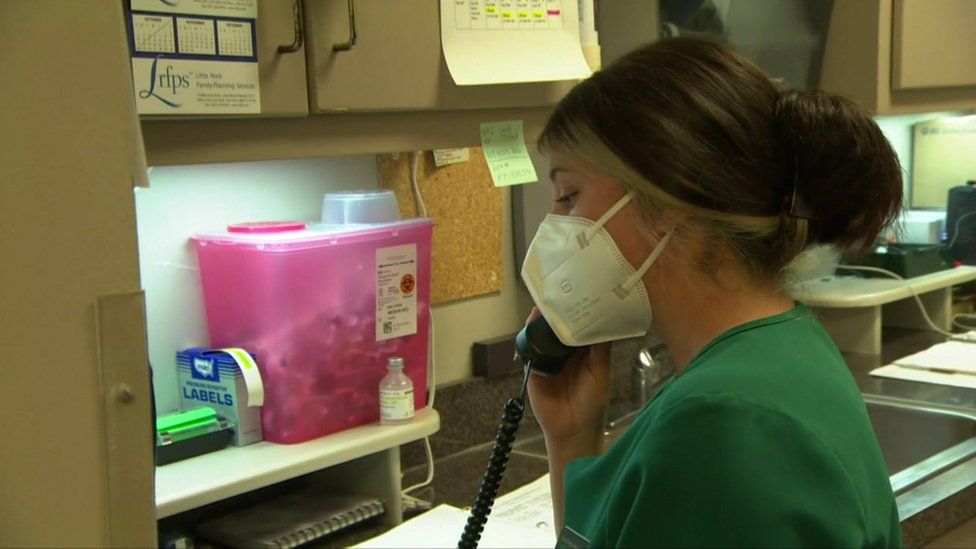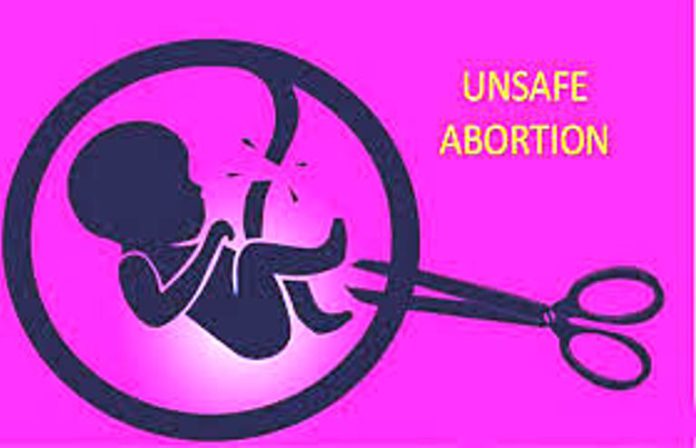Clinics have begun closing in some US states after a Supreme Court ruling on Friday removed American women’s constitutional right to abortion.
About half of states are expected to introduce new restrictions or bans after the court reversed its 50-year-old Roe v Wade decision.
Again, 13 states have so-called trigger laws in place that will see abortion banned within 30 days.
President Joe Biden described the ruling as “a tragic error”.
In Phoenix, Arizona, police fired tear gas after pro-choice protesters banged on the doors and windows of the state capitol. In Los Angeles, protesters briefly blocked traffic on a highway.
Protests are expected to continue in cities around the country on Saturday.
At an abortion clinic in Little Rock, Arkansas – a state with a so-called trigger law allowing an instant ban – the doors to the patient area shut as soon as the court’s opinion was posted online. Staff made calls to tell women that their appointments were cancelled.
“No matter how hard we prepare for bad news, when it finally hits, it hits hard. Having to call these patients and tell them Roe v Wade was overturned is heartbreaking,” nurse Ashli Hunt told the BBC.
Escorts at the clinic, who stood in the Arkansas heat day in and day out to accompany patients through the throng of protesters, held a group hug. “I thought that this country would still care about people. Would still care about women,” said Miss Karen, the lead escort.

Outside, anti-abortion protesters celebrated.
“You are on notice!” shouted a protester at people still parking their cars at the clinic who had not heard about the decision yet. “My suggestion is for you to turn around and leave this place of sin, this place of inequity, this evil place.”
In New Orleans, Louisiana – another trigger law state – the Women’s Health Care Centre, one of only three abortion providers in the state, was closed and its staff had gone home.
Outside the clinic, volunteer escort Linda Kocher told the BBC that rich women would still be able to access abortions in other states but “poor women will end up in a back alley” for illegal procedures. But anti-abortion campaigner Pastor Bill Shanks said it was a “day for celebration”.
Overall, the Supreme Court ruling is expected to mean about 36 million women of reproductive age will lose access to abortion in their states, according to research from Planned Parenthood, a healthcare organisation that provides abortions.
- Trigger laws in Kentucky, Louisiana, Arkansas, South Dakota, Missouri, Oklahoma and Alabama have already been applied
- Bans in Mississippi and North Dakota will come into effect after their attorney generals approve it
- Wyoming’s ban will take effect in five days, Utah’s ban must be certified by a legislative council
- Bans in Idaho, Tennessee and Texas will be applied in 30 days.
The decision was met with elation by anti-abortion campaigners outside the court in Washington, but protests against the ruling were due to be held in more than 50 cities across the US.
Although a divisive issue in the US, a recent Pew survey found that 61% of adults say abortion should be legal all or most of the time, while 37% say it should be illegal all or most of the time.
In San Antonio, Texas, anti-abortion advocate Tere Harding said she was working on a security plan in case protests targeted the crisis pregnancy centre she runs on the outskirts of the city.
“Every human life needs to be protected,” she told the BBC as she watched Mr Biden criticise the Supreme Court decision. “It represents that we acknowledge the humanity of the unborn.”
Mr Biden said the ruling put women’s health and lives at risk.
“It’s a realisation of an extreme ideology and a tragic error by the Supreme Court,” he said.
He said he would work to ensure that state and local officials could not prevent women travelling to have abortions in states where the procedure is legal, and would also protect women’s access to contraception and medication to end pregnancies of up to 10 weeks that is used to treat miscarriages.
Friday’s ruling amounts to a wholesale reversal of the Supreme Court’s own legal precedent – an extremely rare move – and is likely to set up political battles that divide the nation.
The governors of west coast states California, Washington and Oregon have vowed to protect patients travelling from other states for an abortion.
In states where opinions on abortion are closely split – such as Pennsylvania, Michigan and Wisconsin – the legality of the procedure could be determined on an election-by-election basis. In others, the ruling may set off a new round of legal battles, including over whether individuals can go out of state for abortions or order abortion drugs through mail services.
Meanwhile former Vice-President Mike Pence, a long-standing critic of Roe v Wade, urged anti-abortion campaigners not to stop until “the sanctity of life” was protected by law in every state.

